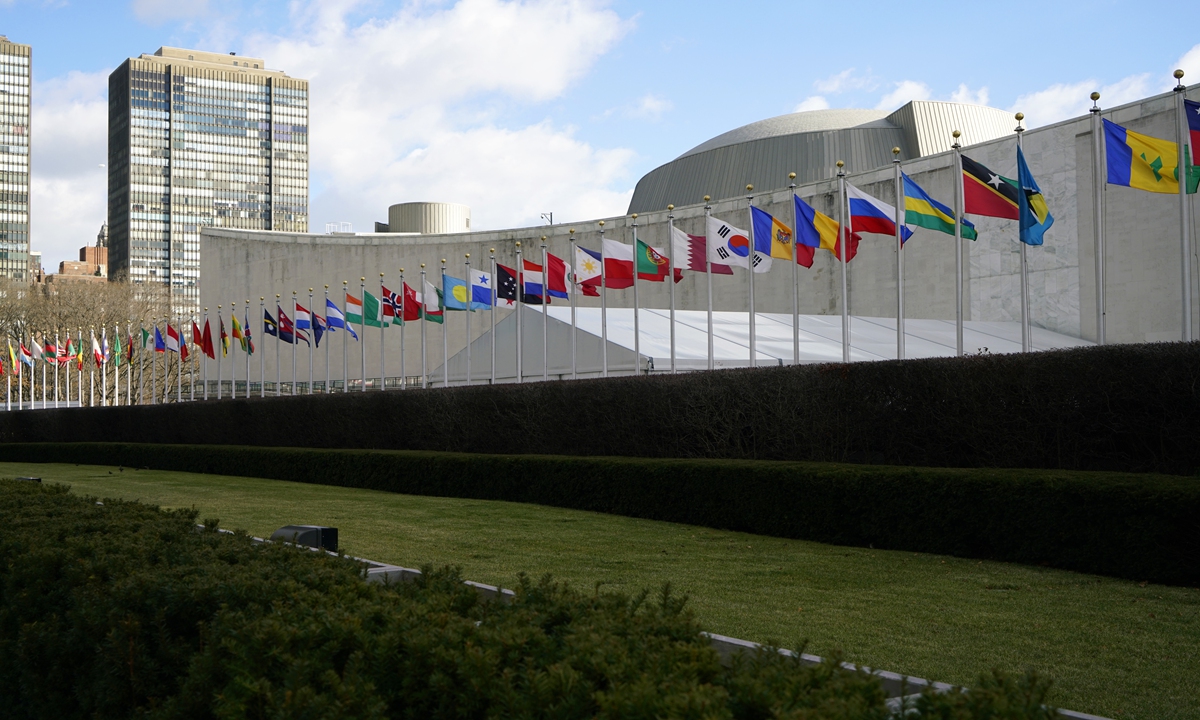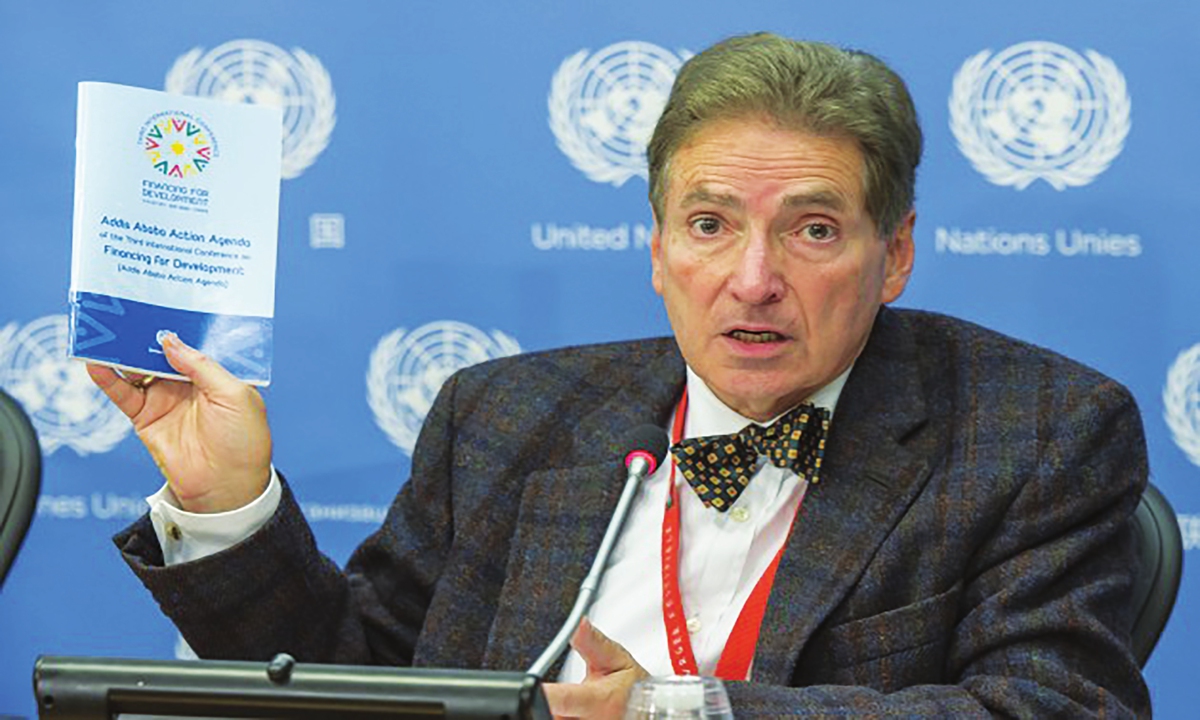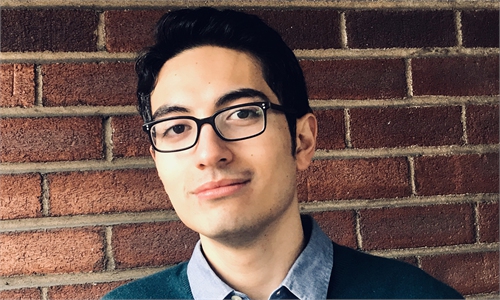
National flags of UN members are seen beside the building of the UN General Assembly. Photo: VCG
Editor's Note:
For the Chinese people, the past decade was epic and inspirational. The country, under the leadership of President Xi Jinping, has made great endeavors in boosting its economy, deepening reforms, improving the rights of its people and acting as a responsible power globally.
The Chinese leader has been advocating a new security concept featuring mutual trust, mutual benefit, equality and coordination. Global Times (GT) reporter Li Aixin talked to Alfred de Zayas (De Zayas), professor of international law at the Geneva School of Diplomacy and former UN independent expert, on his understanding of the world order, as well as the roles China and the US play in it. This is the third of the series.
GT: Congratulations on your books, Building a Just World Order, and the upcoming: Countering Mainstream Narratives: Fake News, Fake Law, Fake Freedom. Would you briefly introduce what you think "a just world order" is? And how do you define the current world order?
De Zayas: We already have a rules-based international order in the form of the UN Charter, and we have international mechanisms to arrive at a just world order, including the International Labor Organization, the World Health Organization, the United Nations Environment Program, the UN Development Program, the Sustainable Development Goals, the International Court of Justice, etc. The problem is that there is little enforcement of international law and resolutions and judgments of international organizations are not being observed.
The Human Rights Council, where China has been playing an increasingly important role in the last few years, is largely politicized and has become too much of a gladiator's arena, in which, instead of demonstrating a spirit of cooperation, States have weaponized it through the propagandistic practice known as "naming and shaming." Countries do not hesitate to accuse other countries, totally evidence-free, of committing crimes against humanity or committing genocide.
The vocation of the HR Council is to be constructive, to help all peoples of the world enjoy human rights in larger freedom. To achieve that the UN can offer States who want it advisory services and technical assistance. The idea is to give positive advice and not to impose a certain model, a one-size-fits-all on countries including China, India or South Africa. China and India are the two most populous nations in the world. Together, they're almost half the population of the world. They don't have the geopolitical influence that they deserve. I think that it is important for China and India to cooperate as much as possible and to contribute to the success of the Human Rights Council.
I think it's important to realize that the rules-based international order and the whole concept of international law will be increasingly impacted and influenced by the development of the world, by the legitimate interests of the Chinese, Indians, Africans and Latin Americans. It is no longer the exclusive domain of the US and Europeans.
There were some arrangements made, which were primarily dictated by the US. Now, our goal is to progress, to make sure that human rights are enjoyed by everybody, and not just by the privileged class.
Few countries have stepped on the UN Charter as often as my country, the US. And it's not just the wars that we ourselves started, like the assault on Iraq, but also the wars that we provoked - the US has been and continues to be engaged in proxy wars throughout the world.
With regard to Ukraine, it seems like the US and NATO are determined to fight Russia till the last Ukrainian. They're willing to sacrifice Ukraine and its people, on the altar of American imperial arrogance and American narcissism. This war could have been avoided.
One of the things that the mainstream media ignores is that the UN Charter doesn't only prohibit the use of force, it prohibits the threat of the use of force. It prohibits saber rattling, war mongering, menacing a country. And what else is the expansion of NATO, but a permanent menace against Russia?
And the mainstream media bears a considerable responsibility, because people tend to believe what they read in The New York Times and the Washington Post and CNN. And the phenomenon is that people also tend to believe their own propaganda. You can deceive yourself. And it constitutes a huge obstacle to reaching peace or any kind of a compromise, if you intransigently divide the world in a binary fashion of good and bad. And when we talk about bad guys, it's China, Russia, and anybody who is not willing to dance to our tune.
Many American professors and intellectuals have recognized that. Noam Chomsky has been writing about that for fifty years. But unfortunately, these thinkers lack political power. They are not influencing the secretary general of the UN or Biden.

Photo: Courtesy of Alfred de Zayas
GT: What is your view on China's role in the world order over the past decade?
De Zayas: China has been visibly more active in the General Assembly, in the Security Council and in the Human Rights Council in Geneva.
China has done a magnificent job of pulling hundreds of millions of people out of poverty. That means human rights. Human rights are the right to peace, life, food, water, sanitation and housing. That must be recognized also by leaders in the US -- Joe Biden and Antony Blinken.
Blinken is always talking about a rules-based international order. My answer to him is: For heaven's sake, we have it! It is the UN Charter. How about implementing it?
And I would think that China should do more in dissemination of news. China has not quite broken the stronghold that the US and Europe have on the dissemination of news. There is an information war. This is a hybrid war that the US has fought very successfully in order to impose our view of things on everybody else, whether it be in Latin America and Africa or in Asia.
GT: As you have mentioned, some observers tend to believe that the US is showing its stance on the world order, which is: Either you are with the US, or against the US.
De Zayas: I have heard that very often. This is not a new phenomenon. This already existed at the time of the Vietnam war in the 1960s and the 1970s.
And it's the same mentality about what we call patriotism or jingoism or chauvinism. I see myself as a patriot. Who is a patriot? A patriot is someone who wants to see social justice domestically, and who wants to see international peace, contribute to world conditions and world trade in a manner that will advance the interests of the people. So the patriot is not the guy who says yes to the government. The patriot is the one who does his level best to ensure that his government is actually doing good, advancing the interests of the population.
And advancing the interests of the population is certainly not spending more than 40 percent of the national budget in military bases like Guantanamo, but putting the money into education, into maintenance of essential infrastructures. The bridges fall on the Mississippi. There's no priority for that. Hurricane Katrina devastates New Orleans. There's no priority for healthcare. Why have we lost 1 million Americans to COVID? Those hospitals that were not making profits were closed. The money was not put into research and development for the prevention of pandemics and of other disasters. The money was put into the military-industrial complex and into military incursions.
It also goes back to the brainwashing, the indoctrination of the American people through the mainstream media. People say we have a free press; we don't. The six years when I was a UN independent expert for international order, I sent dozens of op-eds to the New York Times. No response. I was not interviewed once, by CNN or the Washington Post. Since I am not going to sing the song they want to hear, they don't ask.
That is part of the problem. If you have a population that has been indoctrinated and brainwashed, you have a government by people who actually believe their own propaganda. How then are you going to build a just world order?
GT: Some say the US-led world order is challenged by China. But there are also observers who say the real challenge to the current world order comes from Western countries and that China is actually maintaining that order. What is your view?
De Zayas: Donald Trump had his motto: Make America Great Again. That meant full spectrum domination. The US was doing it for several decades after WWII. But we live in the 21st century. It's ridiculous to think that we can simply order people around. That is 19th century imperialism, or 20th century colonialism and neo-colonialism.
We have to simply take into an account that China exists. So the only thing that an intelligent person does is to find a model that is a win-win situation. China benefits from good trade relations with the US. The US benefits from good trade relations with China. But we seem to have a kind of paranoia, a kind of persecution complex, whenever someone in the world articulates interests that are not in conformity with our interests. We see that as aggression, as a threat; it's a ridiculous attitude.
China has demonstrated its patience, it displays moderation, which reflects millennia of tradition and culture, like the drop that eventually pierces the stone. It continues reminding the UN Security Council of the letter and the spirit of the UN Charter. It continues reminding the Human Rights Council of the letter and the spirit of the Universal Declaration of Human Rights.
I salute China for having played an important role in the adoption of a very important resolution in the human rights council at the 48th session in September 2021, Resolution 48/7. That was on the effects of neocolonialism, the sequels of colonialism and imperialism on indigenous peoples, in North and South America and in the Pacific islands.
Whenever I hear the US talking about self-determination in Tibet (Southwest China's Xizang Autonomous Region), etc, I say, do we know Tibet's history? How about talking about the self-determination of the people of Hawaii?
Why is Hawaii a state of the US? It is thousands of miles away from San Francisco and Los Angeles. Even president Bill Clinton, back in 1993, issued an apology to the people of Hawaii for having toppled the kingdom of Hawaii in 1893, 100 years earlier. Of course, he did not offer to give the Hawaiians their kingdom back.
The US likes to place itself in the position of being the judge. We judge others. Others cannot judge us. That's why the US does not accept the automatic jurisdiction of the International Court of Justice, or of the International Criminal Court. We're above it. That is, once again, the problem of the wrong mindset.
I think that China should send the White House 1,000 mirrors to be placed in every room, in the halls of the US Congress, so that we can look at ourselves. If we could develop a faculty of self-criticism, that would be very useful for ourselves and it would promote world peace. What we have done and continue to do is contrary to international law and international order.
GT: China has been advocating a new security concept featuring mutual trust, mutual benefit, equality and coordination. Do you think China's concept might offer some clues for a future world security order?
De Zayas: I would agree with China's concept. And I would hope that China does its utmost in giving visibility to this vision, to get this proposal of security architecture to be accepted. In order to get there, China could possibly hold a World Summit on International Security.
If China were to host such a world summit and invite India, South Africa, Brazil, Mexico, and of course the Europeans and the Americans, it would be clear that this World Summit would actually represent the planet and not represent what the West calls the "international community."
When we're talking about the international community, it is about 20 to 25 countries. We're talking about the US, Canada, Japan, Australia, New Zealand, the UK, France, Germany... Is that the international community? It isn't. It's maybe 15 percent of the world population. How about the remaining 85 percent?
China represents one fifth of humanity. I would like to see China's vision being taken into account and becoming more generally known.

